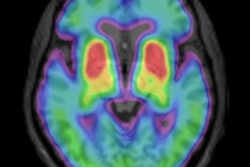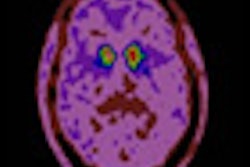With the help of FDG-PET, researchers at the Feinstein Institute for Medical Research in Manhasset, NY, have developed an automated image-based classification procedure to differentiate patients with idiopathic Parkinson's disease from those with other brain diseases such as multiple system atrophy and progressive supranuclear palsy.
The study, published online January 11 in Lancet, concludes that the process has "high specificity in distinguishing between Parkinsonian disorders and could help in selecting treatment for early-stage patients and identifying participants for clinical trials."
Idiopathic Parkinson's disease can present with symptoms similar to multiple system atrophy or progressive supranuclear palsy, noted lead author Dr. David Eidelberg, director of the Center for Neurosciences. The researchers analyzed 167 patients between January 1998 and December 2006. The patients all had symptoms of Parkinson's disease, but their clinical diagnosis was uncertain.
For each patient, the likelihood of having each of the three diseases was calculated using multiple disease-related patterns with logistic regression and "leave-one-out" cross-validation.
After FDG-PET imaging, patients were assessed by blinded movement disorder specialists for a mean of two to six years before final clinical diagnosis. The accuracy of the initial image-based classification was then compared to the final diagnosis.
The researchers found that the image-based classification for idiopathic Parkinson's disease had sensitivity of 84%, specificity of 97%, positive predictive value of 98%, and negative predictive value of 82%.
Imaging classifications also were accurate for multiple system atrophy, with sensitivity of 85%, specificity of 96%, positive predictive value of 97%, and negative predictive value of 83%.
For progressive supranuclear palsy, the results were sensitivity of 88%, specificity of 94%, positive predictive value of 91%, and negative predictive value of 92%.
By Wayne Forrest
AuntMinnie.com staff writer
January 11, 2010
Related Reading
PET plays key role in Parkinson's research, January 5, 2010
PET shows promise for migraines, schizophrenia, October 30, 2009
Michael J. Fox Foundation awards neuroimaging grants, February 19, 2009
Gene therapy for Parkinson's disease modulates abnormal brain networks, November 20, 2007
Gene therapy treatment offers Parkinson's relief, June 25, 2007
Copyright © 2010 AuntMinnie.com




















